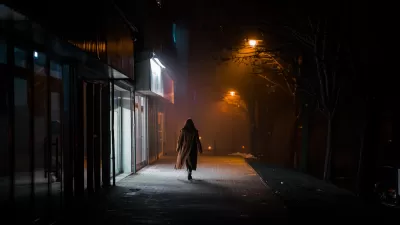Safety is a major concern for the world's women on a day-to-day basis. From riding the bus to walking at night, if women don't feel safe, they won't do it. Cities need to take a more active role in addressing this challenge, according to this post.
Next American City's Rachel Somerstein looks at some of the concerns being faced in global cities and how officials are countering unsafe conditions. This post is part of coverage of a recent conference looking at cities and women's health issues.
"Mexico City native Claudia Garcia-Moreno, Coordinator of the Department of Gender, Women, and Health at the World Health Organization, told the audience that 60 percent of women in Montreal are afraid of walking their neighborhoods at night. Only 17 percent of men feel the same.
That statistic illustrates two of the more complex issues that planners must account for when planning safe cities for women: actual safety – and the perception of safety. Although related, addressing actual public-safety issues is somewhat different from vanquishing a culture of fear. Especially because working-class and well-off women alike, from Manhattan to Manila, are accustomed to being afraid."
FULL STORY: Making Cities Safe for Women

Maui's Vacation Rental Debate Turns Ugly
Verbal attacks, misinformation campaigns and fistfights plague a high-stakes debate to convert thousands of vacation rentals into long-term housing.

Planetizen Federal Action Tracker
A weekly monitor of how Trump’s orders and actions are impacting planners and planning in America.

In Urban Planning, AI Prompting Could be the New Design Thinking
Creativity has long been key to great urban design. What if we see AI as our new creative partner?

Portland Raises Parking Fees to Pay for Street Maintenance
The city is struggling to bridge a massive budget gap at the Bureau of Transportation, which largely depleted its reserves during the Civd-19 pandemic.

Spokane Mayor Introduces Housing Reforms Package
Mayor Lisa Brown’s proposals include deferring or waiving some development fees to encourage more affordable housing development.

Houston Mayor Kills Another Bike Lane
The mayor rejected a proposed bike lane in the Montrose district in keeping with his pledge to maintain car lanes.
Urban Design for Planners 1: Software Tools
This six-course series explores essential urban design concepts using open source software and equips planners with the tools they need to participate fully in the urban design process.
Planning for Universal Design
Learn the tools for implementing Universal Design in planning regulations.
Gallatin County Department of Planning & Community Development
Heyer Gruel & Associates PA
JM Goldson LLC
City of Camden Redevelopment Agency
City of Astoria
Transportation Research & Education Center (TREC) at Portland State University
Jefferson Parish Government
Camden Redevelopment Agency
City of Claremont





























